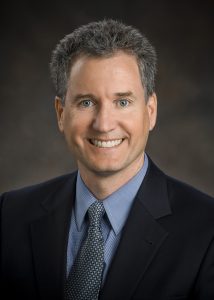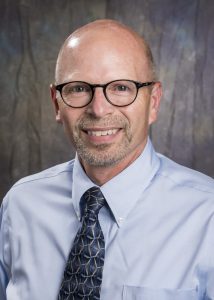
Peter Reynolds is associate professor and director of the Family Medicine Residency Program in the Boonshoft School of Medicine.
Family medicine residents at the Wright State University Boonshoft School of Medicine will receive additional training to care for the mental and behavioral health needs of children, adolescents and young adults thanks to a nearly $2.3 million federal award.
Under the five-year award from the Health Resources and Services Administration, the Boonshoft School of Medicine will establish new training experiences for family medicine residents with community partners. Faculty in the departments of Family Medicine, Pediatrics and Psychiatry will collaborate in the training program.
The training will focus on mental and behavioral health problems, including substance use disorders, suicide prevention, trauma-informed care and the effects of abuse and gun violence on young people.
“The presence of a mental or behavioral health problem increases the risk for other medical problems, including chronic illnesses. Making effective mental health care more available for the younger segment of our population is one important step that can be taken to help improve the overall health of our population,” said Paul Hershberger, Ph.D., associate dean for research affairs and professor and director of behavioral health in the Department of Family Medicine.
Peter Reynolds, M.D., associate professor and director of the Family Medicine Residency Program in the Boonshoft School of Medicine, is project director of this training initiative, with Hershberger serving as co-project director.
An estimated one in five children is affected by a mental health disorder, but the majority of these children do not receive appropriate services. One of the reasons for this is the lack of trained and available primary care physicians to provide such care, Hershberger said.
“Family medicine physicians receive training to provide mental health care, but often this training is focused more on adults than on children and adolescents,” he said.
A 2019 Community Health Needs Assessment of southwest Ohio, northern Kentucky and southeast Indiana found that the top two health priorities are substance misuse and mental health. The Miami Valley itself has high rates of substance use disorders, and it is estimated that over one-third of local youth seen by physicians in Montgomery County have been traumatized by violence, including firearm-related violence.
However, southwest Ohio includes pockets of primary care and mental health shortage areas, which means that the need for such services is greater than the availability of professionals to provide these services.
“Primary care is typically the front line for identifying and treating mental and behavioral health issues,” Hershberger said. “While BSOM family residents currently receive excellent training in pediatrics, there is a need for more dedicated training in pediatric mental and behavioral health.”

Paul Hershberger is associate dean for research affairs and professor and director of behavioral health in the Department of Family Medicine.
Under the project, Boonshoft School of Medicine family medicine residents will receive training in the prevention, identification, diagnosis, treatment and referral of services for mental and behavioral health conditions. The effectiveness of the expanded training experiences will be studied over the five-year period.
The Boonshoft School of Medicine will also develop and expand its partnerships with integrated behavioral health and primary care settings and community organizations to provide additional clinical rotations for family medicine residents.
In addition to the current inpatient and outpatient medicine rotations that family medicine residents complete at Dayton Children’s Hospital, they will work with psychiatrists at Dayton Children’s. Residents will also gain experience in the Student Health Center at Central State University.
Residents will also continue to receive training with OneFifteen, an addiction treatment center in Dayton, and Dayton Public Schools. Family Health Services, a federally qualified health center in Greenville, will be added as a new training site.
The medical school will also develop or enhance its mental and behavioral health content in didactic and clinical training for family medicine residents, including suicide prevention, trauma-informed care and the effects of abuse and gun violence.
“The experience of adversity in childhood is known to predispose individuals to poorer health across the lifespan, including poorer mental health. While prevention is most desirable, to the extent that mental health problems can be appropriately diagnosed and treated early in life, risks for substance use disorders, suicide and the perpetuation of patterns of abuse can be reduced,” Hershberger said.
New didactic training sessions will begin within the next few months with new features in the residents’ clinical rotations starting in July.
Every year 10 residents are accepted into the Boonshoft School of Medicine Family Medicine Residency Program, spending three years in the program.
While it is difficult to estimate how far-reaching the project will be, Hershberger said that “each family medicine resident who receives training supported by the project will be better prepared to serve the mental and behavioral needs of patients. Current patients of residents will benefit, but so will the thousands of patients for whom they provide care over their careers as physicians.”

 Glowing grad
Glowing grad  Wright State’s Homecoming Week features block party-inspired events Feb. 4–7 on the Dayton Campus
Wright State’s Homecoming Week features block party-inspired events Feb. 4–7 on the Dayton Campus  Wright State music professor honored with Ohio’s top music education service award
Wright State music professor honored with Ohio’s top music education service award  Wright State’s Industrial and Human Factors Engineering program named one of top online graduate programs by U.S. News
Wright State’s Industrial and Human Factors Engineering program named one of top online graduate programs by U.S. News  Student-run ReyRey Café celebrates decade of entrepreneurship at Wright State
Student-run ReyRey Café celebrates decade of entrepreneurship at Wright State 